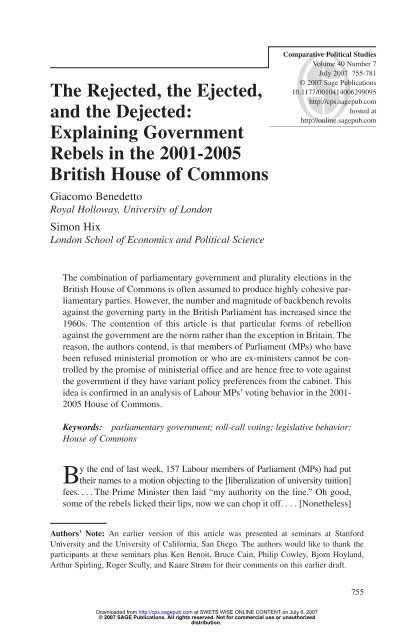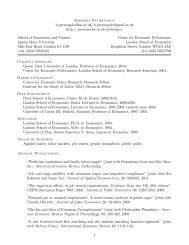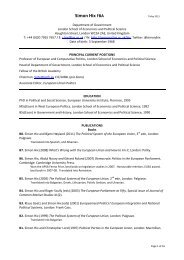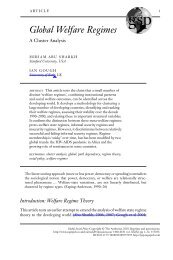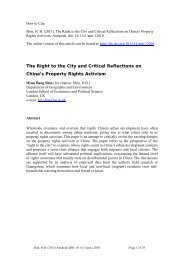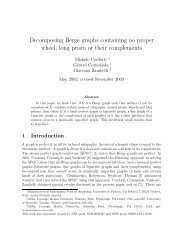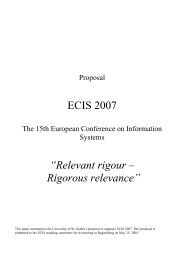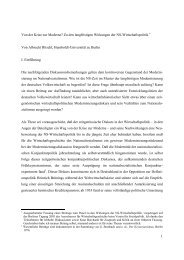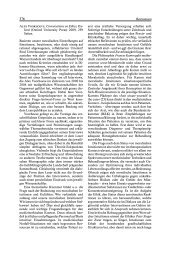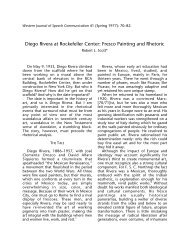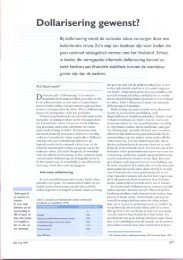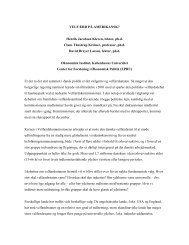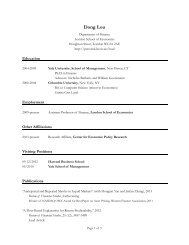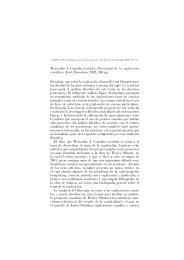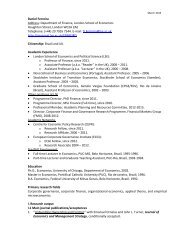The Rejected, the Ejected, and the Dejected: Explaining ...
The Rejected, the Ejected, and the Dejected: Explaining ...
The Rejected, the Ejected, and the Dejected: Explaining ...
You also want an ePaper? Increase the reach of your titles
YUMPU automatically turns print PDFs into web optimized ePapers that Google loves.
<strong>The</strong> <strong>Rejected</strong>, <strong>the</strong> <strong>Ejected</strong>,<br />
<strong>and</strong> <strong>the</strong> <strong>Dejected</strong>:<br />
<strong>Explaining</strong> Government<br />
Rebels in <strong>the</strong> 2001-2005<br />
British House of Commons<br />
Giacomo Benedetto<br />
Royal Holloway, University of London<br />
Simon Hix<br />
London School of Economics <strong>and</strong> Political Science<br />
Comparative Political Studies<br />
Volume 40 Number 7<br />
July 2007 755-781<br />
© 2007 Sage Publications<br />
10.1177/0010414006299095<br />
http://cps.sagepub.com<br />
hosted at<br />
http://online.sagepub.com<br />
<strong>The</strong> combination of parliamentary government <strong>and</strong> plurality elections in <strong>the</strong><br />
British House of Commons is often assumed to produce highly cohesive parliamentary<br />
parties. However, <strong>the</strong> number <strong>and</strong> magnitude of backbench revolts<br />
against <strong>the</strong> governing party in <strong>the</strong> British Parliament has increased since <strong>the</strong><br />
1960s. <strong>The</strong> contention of this article is that particular forms of rebellion<br />
against <strong>the</strong> government are <strong>the</strong> norm ra<strong>the</strong>r than <strong>the</strong> exception in Britain. <strong>The</strong><br />
reason, <strong>the</strong> authors contend, is that members of Parliament (MPs) who have<br />
been refused ministerial promotion or who are ex-ministers cannot be controlled<br />
by <strong>the</strong> promise of ministerial office <strong>and</strong> are hence free to vote against<br />
<strong>the</strong> government if <strong>the</strong>y have variant policy preferences from <strong>the</strong> cabinet. This<br />
idea is confirmed in an analysis of Labour MPs’ voting behavior in <strong>the</strong> 2001-<br />
2005 House of Commons.<br />
Keywords: parliamentary government; roll-call voting; legislative behavior;<br />
House of Commons<br />
By <strong>the</strong> end of last week, 157 Labour members of Parliament (MPs) had put<br />
<strong>the</strong>ir names to a motion objecting to <strong>the</strong> [liberalization of university tuition]<br />
fees....<strong>The</strong> Prime Minister <strong>the</strong>n laid “my authority on <strong>the</strong> line.” Oh good,<br />
some of <strong>the</strong> rebels licked <strong>the</strong>ir lips, now we can chop it off. . . . [None<strong>the</strong>less]<br />
Authors’ Note: An earlier version of this article was presented at seminars at Stanford<br />
University <strong>and</strong> <strong>the</strong> University of California, San Diego. <strong>The</strong> authors would like to thank <strong>the</strong><br />
participants at <strong>the</strong>se seminars plus Ken Benoit, Bruce Cain, Philip Cowley, Bjorn Hoyl<strong>and</strong>,<br />
Arthur Spirling, Roger Scully, <strong>and</strong> Kaare Strøm for <strong>the</strong>ir comments on this earlier draft.<br />
Downloaded from<br />
http://cps.sagepub.com at SWETS WISE ONLINE CONTENT on July 6, 2007<br />
© 2007 SAGE Publications. All rights reserved. Not for commercial use or unauthorized<br />
distribution.<br />
755
756 Comparative Political Studies<br />
one member of <strong>the</strong> Cabinet scorns <strong>the</strong>m as “<strong>the</strong> <strong>Rejected</strong>, <strong>the</strong> <strong>Ejected</strong> <strong>and</strong> <strong>the</strong><br />
<strong>Dejected</strong>.”<br />
Andrew Rawnsley, 2003<br />
As Walter Bagehot (1867/2001) famously observed, at <strong>the</strong> heart of <strong>the</strong> British<br />
parliamentary model is <strong>the</strong> fusion of <strong>the</strong> cabinet to a parliamentary majority.<br />
As a result of this fusion, voters are strongly party oriented <strong>and</strong> MPs need<br />
effective party leaderships to be reelected (Cox, 1987). So, despite <strong>the</strong> fact<br />
that Britain has plurality elections in single-member districts, agenda control<br />
by <strong>the</strong> cabinet in <strong>the</strong> legislature produces party-centered elections <strong>and</strong> cohesive<br />
parliamentary parties. <strong>The</strong> result, allegedly, is a highly responsive form<br />
of democracy in which <strong>the</strong> government is in effect directly accountable to <strong>the</strong><br />
electorate (Persson & Tabellini, 2003; Powell, 2000).<br />
But what if <strong>the</strong> cohesion of <strong>the</strong> governing party breaks down? <strong>The</strong>re<br />
have been significant backbench rebellions against governments at several<br />
points in <strong>the</strong> recent history of <strong>the</strong> House of Commons, such as under <strong>the</strong><br />
Heath, Wilson, <strong>and</strong> Callaghan governments in <strong>the</strong> 1970s (Franklin, Baxter,<br />
& Jordan, 1986; Gaines & Garrett, 1993), <strong>the</strong> Major government in <strong>the</strong><br />
early 1990s (Cowley, 2002; Cowley & Norton, 1999; Kam, 2001), <strong>and</strong><br />
more recently, in <strong>the</strong> second term of <strong>the</strong> Blair administration. Are <strong>the</strong>se isolated<br />
events? If not, what does this mean for our general underst<strong>and</strong>ing of<br />
<strong>the</strong> Westminster model of government?<br />
<strong>The</strong> contention of this article is that backbench rebellions against <strong>the</strong><br />
governing party in <strong>the</strong> House of Commons will occur under specific conditions.<br />
<strong>The</strong> patronage of ministerial appointment is only effective in disciplining<br />
current ministers <strong>and</strong> backbenchers who believe that <strong>the</strong>y have a<br />
chance of being promoted to ministerial office. <strong>The</strong>se patronage incentives<br />
do not work for ex-ministers or for MPs who do not believe that <strong>the</strong>y will<br />
be promoted. <strong>The</strong>se “ejected” ex-ministers <strong>and</strong> “rejected” backbenchers are<br />
free to vote with <strong>the</strong>ir preferences, <strong>and</strong> so may rebel if <strong>the</strong>y disagree on a<br />
particular policy. Fur<strong>the</strong>rmore, <strong>the</strong> threat of government collapse is not<br />
effective against preference-outlier MPs if <strong>the</strong>se “dejected” members<br />
expect that a new cabinet will form closer to <strong>the</strong>ir preferences.<br />
In this article, we start by reviewing existing research on voting in <strong>the</strong><br />
House of Commons before developing a <strong>the</strong>ory of government rebellions in<br />
parliamentary systems. According to <strong>the</strong> <strong>the</strong>ory, <strong>the</strong> likelihood of rebellion<br />
increases if <strong>the</strong> governing party is ideologically heterogeneous, if <strong>the</strong> government<br />
has been in office for some time, if <strong>the</strong> next cabinet is likely to be<br />
closer to <strong>the</strong> preferences of potential rebels than <strong>the</strong> current cabinet, <strong>and</strong> if<br />
c<strong>and</strong>idates are deselected locally. All <strong>the</strong>se conditions existed for <strong>the</strong> Labour<br />
Downloaded from<br />
http://cps.sagepub.com at SWETS WISE ONLINE CONTENT on July 6, 2007<br />
© 2007 SAGE Publications. All rights reserved. Not for commercial use or unauthorized<br />
distribution.
Benedetto, Hix / Government Rebels in House of Commons 757<br />
government in <strong>the</strong> 2001-2005 British House of Commons. In <strong>the</strong> empirical<br />
section of <strong>the</strong> article, we test <strong>the</strong>se ideas by looking at <strong>the</strong> voting behavior<br />
of Labour MPs in all votes in <strong>the</strong> 2001-2005 Parliament <strong>and</strong> in three highprofile<br />
votes: on <strong>the</strong> Iraq War, hospital reforms, <strong>and</strong> university fees.<br />
Research on Government Rebellion<br />
in <strong>the</strong> British House of Commons<br />
Scholars have studied voting in <strong>the</strong> House of Commons since William<br />
Aydelotte’s (1954, 1963) research on <strong>the</strong> House in <strong>the</strong> 1840s. Rebellions<br />
against <strong>the</strong> government have been rare because party leaders can use ministerial<br />
patronage to enforce discipline, because <strong>the</strong> electoral success of<br />
MPs is dependent on <strong>the</strong> effectiveness of <strong>the</strong> party leadership, <strong>and</strong> because<br />
potential rebels expect that government collapse could lead to subsequent<br />
electoral defeat. Existing research has also demonstrated that when rebellions<br />
have occurred, <strong>the</strong>se have tended to be because of ideological differences<br />
between backbenchers <strong>and</strong> <strong>the</strong> leadership ra<strong>the</strong>r than because of<br />
pressures from constituency interests relevant to a vote or set of votes.<br />
Schonhardt-Bailey (2003) showed that constituency interests prevailed<br />
over ideology in <strong>the</strong> battle over <strong>the</strong> Corn Laws in <strong>the</strong> 1840s. Most MPs from<br />
constituencies that would benefit from free trade voted to repeal <strong>the</strong> Corn<br />
Laws, irrespective of <strong>the</strong>ir party affiliation. Cox (1987) argues, however, that<br />
national party platforms were not fully developed in <strong>the</strong> 1840s, so politicians<br />
were more beholden at that time to <strong>the</strong>ir constituencies than to <strong>the</strong> electoral<br />
promises of <strong>the</strong>ir party leaders. Also, ministerial patronage was not a powerful<br />
force until later. Looking at roll-call votes in <strong>the</strong> 1860s to <strong>the</strong> 1880s,<br />
Cox (1987, pp. 77-78) found that Conservative MPs who later became ministers<br />
were 6% more likely to following voting instructions than MPs who<br />
were not promoted to ministerial office.<br />
<strong>The</strong> carrot of ministerial promotion plus <strong>the</strong> national electoral connection<br />
prevented major backbench rebellions until <strong>the</strong> 1960s (Norton, 1975,<br />
1980). Schwartz (1980) attributed <strong>the</strong> emergence of rebellion after 1960 to<br />
<strong>the</strong> ab<strong>and</strong>onment of <strong>the</strong> so-called “parliamentary rule,” whereby a government<br />
would resign if it lost any vote. Looking at 10 rebellions from 1959<br />
to 1968, Schwartz <strong>and</strong> Lambert (1971) found that, freed from <strong>the</strong> threat of<br />
new elections if a government was defeated, rebels tended to be<br />
Conservative backbenchers who ei<strong>the</strong>r did not expect to be promoted to<br />
ministerial office, who were not mainstream members of <strong>the</strong> party, or who<br />
had strong support from <strong>the</strong>ir local party constituency associations. Jackson<br />
Downloaded from<br />
http://cps.sagepub.com at SWETS WISE ONLINE CONTENT on July 6, 2007<br />
© 2007 SAGE Publications. All rights reserved. Not for commercial use or unauthorized<br />
distribution.
758 Comparative Political Studies<br />
(1968) <strong>and</strong> Mellors (1978) argued that <strong>the</strong> “new breed” of young politicians<br />
who won Westminster seats in <strong>the</strong> 1964 election were less prepared<br />
to support <strong>the</strong> party than older MPs (cf. Norton, 1978). However, Franklin<br />
et al. (1986) found that in <strong>the</strong> 1970-1974 Parliament, newer members were<br />
not significantly more likely to vote against <strong>the</strong>ir party than were older<br />
members.<br />
Gaines <strong>and</strong> Garrett (1993) <strong>the</strong>n found that ideological preferences <strong>and</strong><br />
constituency pressures interacted in <strong>the</strong> rebellions against <strong>the</strong> 1974-1979<br />
Labour government. Labour MPs who were members of <strong>the</strong> left-wing<br />
Tribune Group <strong>and</strong> MPs from left-wing constituency parties were more<br />
likely to vote against <strong>the</strong> government. <strong>The</strong>y also found that <strong>the</strong> size of an<br />
MP’s electoral majority was significant, with <strong>the</strong> MPs with larger majorities<br />
defecting more than <strong>the</strong> average, although <strong>the</strong> magnitude of this effect<br />
was small.<br />
<strong>The</strong>re were few rebellions against <strong>the</strong> Thatcher governments from 1979<br />
until 1990. Crowe (1986) primarily attributed this to socialization among<br />
MPs, where support for <strong>the</strong> government resulted from routinized behavior<br />
ra<strong>the</strong>r than strategic calculation (cf. Mughan, Box-Steffensmeier, & Scully,<br />
1997). Never<strong>the</strong>less, Crowe also pointed to <strong>the</strong> way that Thatcher used promotion<br />
promises <strong>and</strong> appealed directly to Conservative voters over <strong>the</strong><br />
heads of more moderate backbenchers. Hence, national party performance<br />
<strong>and</strong> office incentives were also used to enforce party cohesion at a time of<br />
relatively high ideological heterogeneity in <strong>the</strong> parliamentary Conservative<br />
Party. Interestingly, Pattie, Fieldhouse, <strong>and</strong> Johnston (1994) found no constituency-level<br />
electoral connection in this period, in that Conservative<br />
MPs’ voting behavior in <strong>the</strong> 1987-1992 Parliament had no effect on <strong>the</strong>ir<br />
subsequent share of <strong>the</strong> vote in <strong>the</strong> 1992 election.<br />
Ideological heterogeneity in <strong>the</strong> Conservative ranks was more difficult to<br />
contain during John Major’s Conservative government in <strong>the</strong> 1992-1997<br />
Parliament. Looking at this period, Kam (2001) argued that party organizational<br />
power is generally a stronger determinant of voting in <strong>the</strong> House of<br />
Commons than MPs’ policy preferences. However, using data from a survey<br />
of MPs, he also found that <strong>the</strong> fur<strong>the</strong>r to <strong>the</strong> right that a Conservative<br />
MP was in that parliament, <strong>the</strong> more likely that he or she was to vote against<br />
<strong>the</strong> government (cf. Cowley & Norton, 1999).<br />
Looking at <strong>the</strong> first Blair government, in 1997-2001, Cowley (2002) found<br />
that only two prolific rebels, Tony Banks <strong>and</strong> Chris Mullin, were appointed<br />
to junior ministerial office in 1997, which suggests that MPs with ministerial<br />
ambitions are well advised to stay loyal. He also found that ideology<br />
Downloaded from<br />
http://cps.sagepub.com at SWETS WISE ONLINE CONTENT on July 6, 2007<br />
© 2007 SAGE Publications. All rights reserved. Not for commercial use or unauthorized<br />
distribution.
Benedetto, Hix / Government Rebels in House of Commons 759<br />
mattered, in that membership of <strong>the</strong> left-wing Socialist Campaign Group<br />
was a significant predictor of voting against <strong>the</strong> government. Similarly,<br />
Garner <strong>and</strong> Letki (2005) found that <strong>the</strong> “isolation” of backbenchers was <strong>the</strong><br />
main cause of rebellion against <strong>the</strong> Blair government in 1997-1999. This isolation<br />
was most prevalent between two types of backbenchers: (a) those who<br />
had been in <strong>the</strong> parliament a long time <strong>and</strong> had not been promoted to ministerial<br />
office <strong>and</strong> (b) those who were on <strong>the</strong> left of <strong>the</strong> parliamentary party.<br />
Hence, even after <strong>the</strong> ab<strong>and</strong>onment of <strong>the</strong> norm that a government defeat<br />
would automatically trigger new elections, existing research suggests that<br />
<strong>the</strong> carrot of ministerial office, <strong>the</strong> nationwide electoral appeal of a unified<br />
party, <strong>and</strong> <strong>the</strong> social norm of loyalty to <strong>the</strong> party were usually sufficient to<br />
ensure highly cohesive governing parties in <strong>the</strong> House of Commons.<br />
Never<strong>the</strong>less, existing research also suggests that when cohesion does<br />
break down, rebels tend to be backbenchers who are unlikely to return to,<br />
or be promoted to, ministerial office, <strong>and</strong>/or MPs on <strong>the</strong> ideological<br />
extremes of governing parties ra<strong>the</strong>r than in <strong>the</strong> center. This later finding is<br />
particularly significant, as it runs counter to <strong>the</strong> st<strong>and</strong>ard spatial model of<br />
legislative behavior, which predicts that centrist MPs are more likely than<br />
extremist MPs to be torn between <strong>the</strong> government’s policy <strong>and</strong> <strong>the</strong> policy<br />
of an opposition party (e.g., Krehbiel, 1993).<br />
Consequently, existing research has identified which types of MPs tend<br />
to rebel in <strong>the</strong> House of Commons. Never<strong>the</strong>less, <strong>the</strong> literature has not identified<br />
<strong>the</strong> precise institutional <strong>and</strong> political conditions that cause <strong>the</strong>se MPs<br />
to rebel when, in general, <strong>the</strong>y remain loyal. This is what we try to do in <strong>the</strong><br />
next section.<br />
A Rationalist <strong>The</strong>ory of Government Rebellions in<br />
Parliamentary Systems<br />
In a parliamentary system, <strong>the</strong> party or parties who form <strong>the</strong> cabinet control<br />
<strong>the</strong> legislative agenda (e.g., Cox & McCubbins, 2005; Huber, 1996a;<br />
Tsebelis, 2002). MPs from nongoverning parties or backbenchers from<br />
governing parties can propose legislation or table amendments, but <strong>the</strong>se<br />
are unlikely to pass without government support. Hence, an MP is more<br />
likely to secure his or her policy preferences if his or her party is in government.<br />
If <strong>the</strong> government falls, ano<strong>the</strong>r cabinet may not include <strong>the</strong> MP’s<br />
party, <strong>and</strong> if a new election is held, <strong>the</strong> MP may not be reelected or his or<br />
her party may not be in <strong>the</strong> government in <strong>the</strong> new Parliament. Hence, one<br />
Downloaded from<br />
http://cps.sagepub.com at SWETS WISE ONLINE CONTENT on July 6, 2007<br />
© 2007 SAGE Publications. All rights reserved. Not for commercial use or unauthorized<br />
distribution.
760 Comparative Political Studies<br />
of <strong>the</strong> key mechanisms that enables governing party elites to control <strong>the</strong>ir<br />
legislative troops is <strong>the</strong> vote-of-confidence procedure (Diermeier &<br />
Feddersen, 1998; Huber, 1996b). If a vote is likely to be close, <strong>the</strong> government<br />
can force its backbenchers to support its positions by attaching <strong>the</strong><br />
issue to <strong>the</strong> threat of resignation <strong>and</strong>/or new parliamentary elections.<br />
However, <strong>the</strong> threat of government defeat is not effective against particular<br />
MPs in particular circumstances. Because <strong>the</strong> cabinet controls <strong>the</strong> legislative<br />
agenda, MPs who are ideologically distant from a governing party<br />
have an incentive to try to change <strong>the</strong> makeup of a cabinet in <strong>the</strong>ir policy<br />
direction. If a government defeat will lead to early elections <strong>and</strong> <strong>the</strong> possibility<br />
that <strong>the</strong>ir party will not be in government—<strong>and</strong>, hence, <strong>the</strong> next cabinet<br />
is fur<strong>the</strong>r from <strong>the</strong>ir preferences—<strong>the</strong>n <strong>the</strong>se MPs will stay loyal to<br />
<strong>the</strong>ir party in a crucial vote. However, if a government defeat is unlikely to<br />
lead to <strong>the</strong> dissolution of <strong>the</strong> Parliament, <strong>and</strong> instead leads to <strong>the</strong> replacement<br />
of <strong>the</strong> party leadership with a new leadership closer to <strong>the</strong>ir policy<br />
preferences, <strong>the</strong>n extremist MPs have an incentive to try to provoke a government<br />
defeat. Party leaderships tend to be closer to <strong>the</strong> median voter than<br />
<strong>the</strong> average MP (e.g., Kitschelt, 1989). Hence, <strong>the</strong> incentives for provoking<br />
government defeat are stronger for MPs on <strong>the</strong> ideological extremes than in<br />
<strong>the</strong> ideological center: for instance, on <strong>the</strong> right of a center-right government<br />
or on <strong>the</strong> left of a center-left government. This consequently explains<br />
why extremist MPs in parliamentary systems are often less loyal to <strong>the</strong>ir<br />
party leaderships than MPs in <strong>the</strong> center of a Parliament, contrary to <strong>the</strong><br />
st<strong>and</strong>ard spatial model of legislative bargaining.<br />
Never<strong>the</strong>less, loyalty to <strong>the</strong> party leadership in government also operates<br />
at an individual level, in that MPs are more likely to be able to influence<br />
policy as ministers than as backbenchers. Even if one assumes that MPs are<br />
primarily motivated by policy, ra<strong>the</strong>r than by simply <strong>the</strong> perks of political<br />
office, MPs should want to be promoted to ministerial office. As a result,<br />
governing parties can also control <strong>the</strong>ir backbenchers through <strong>the</strong> private<br />
incentive of ministerial promotion.<br />
However, <strong>the</strong> carrot of ministerial promotion is less effective for two types<br />
of MPs: (a) ex-ministers <strong>and</strong> (b) backbenchers who do not believe that <strong>the</strong>y<br />
will be promoted. A significant proportion of ex-ministers do not return to <strong>the</strong><br />
cabinet in most parliamentary systems, <strong>and</strong> backbenchers who have not been<br />
promoted to a ministerial position after <strong>the</strong>ir party has been in power for a significant<br />
period are unlikely to regard <strong>the</strong>ir leaders’ promises of promotion as<br />
credible. Some ex-ministers <strong>and</strong> overlooked backbenchers will be close to<br />
<strong>the</strong> policy positions of <strong>the</strong> government <strong>and</strong> so will still vote with <strong>the</strong> government.<br />
However, those ex-ministers <strong>and</strong> overlooked backbenchers who<br />
Downloaded from<br />
http://cps.sagepub.com at SWETS WISE ONLINE CONTENT on July 6, 2007<br />
© 2007 SAGE Publications. All rights reserved. Not for commercial use or unauthorized<br />
distribution.
Benedetto, Hix / Government Rebels in House of Commons 761<br />
are not ideologically close to <strong>the</strong> government will be less likely to compromise<br />
<strong>the</strong>ir personal policy preferences <strong>and</strong> support <strong>the</strong> government than<br />
MPs who expected to be rewarded for <strong>the</strong>ir loyalty.<br />
Whe<strong>the</strong>r <strong>the</strong> party leadership can force ex-ministers, overlooked backbenchers,<br />
<strong>and</strong> ideological extremists to back <strong>the</strong> party also depends on <strong>the</strong><br />
electoral system <strong>and</strong> <strong>the</strong> way that c<strong>and</strong>idates are elected <strong>and</strong> deselected. For<br />
MPs who do not expect to st<strong>and</strong> in <strong>the</strong> next election, <strong>the</strong>se institutions are<br />
irrelevant. However, if MPs want to be reelected, regardless of <strong>the</strong>ir subsequent<br />
career prospects inside <strong>the</strong> next Parliament, <strong>the</strong>se rules matter.<br />
A party leadership is more able to enforce loyalty in party-centered electoral<br />
systems than in c<strong>and</strong>idate-centered systems (Carey & Shugart, 1995;<br />
Hix, 2004; Mitchell, 2000; Samuels, 1999). In <strong>the</strong> former—such as closedlist<br />
proportional representation—c<strong>and</strong>idates cannot increase <strong>the</strong>ir vote<br />
share by developing personal loyalty among <strong>the</strong> voters independent of <strong>the</strong>ir<br />
party. In <strong>the</strong> latter—such as open-list proportional representation or singletransferable-vote<br />
systems—<strong>the</strong>re are incentives for c<strong>and</strong>idates to gain support<br />
independently of <strong>the</strong>ir party leadership, <strong>and</strong> indeed <strong>the</strong>y might be<br />
rewarded by <strong>the</strong> voters for doing so.<br />
Single-member-simple-plurality (SMSP, or first-past-<strong>the</strong>-post) systems<br />
are between <strong>the</strong>se two extremes. Because only one politician is elected in<br />
each district, voters cannot choose between politicians from <strong>the</strong> same party.<br />
Also, campaigns in SMSP parliamentary systems tend to be fought on<br />
national party platforms ra<strong>the</strong>r than local c<strong>and</strong>idate personalities. Hence,<br />
<strong>the</strong>re are often few possibilities for politicians in <strong>the</strong>se systems to increase<br />
<strong>the</strong>ir electoral prospects independently of <strong>the</strong> performance of <strong>the</strong>ir party<br />
leadership, as Pattie et al. (1994) have shown in <strong>the</strong> case of Britain.<br />
However, because voters in SMSP systems are not forced to vote for a slate<br />
of c<strong>and</strong>idates, <strong>the</strong>re are opportunities for politicians to cultivate some personal<br />
support independently of voters’ support for <strong>the</strong> party <strong>the</strong>y represent.<br />
Also, if politicians have large majorities in <strong>the</strong>ir districts (“safe seats”), <strong>the</strong>y<br />
will be protected against <strong>the</strong> changing nationwide fortunes of <strong>the</strong>ir party.<br />
<strong>The</strong> rules for selecting <strong>and</strong> deselecting c<strong>and</strong>idates interact with <strong>the</strong><br />
design of <strong>the</strong> electoral system. Politicians are more autonomous from <strong>the</strong>ir<br />
leaderships if local party organs, ra<strong>the</strong>r than national party organs, select<br />
<strong>the</strong>m (e.g., Bille, 2001; Rahat & Hazan, 2001). Even when c<strong>and</strong>idates are<br />
chosen locally, to restrict local autonomy, parties often draw up a list of<br />
“approved c<strong>and</strong>idates” from which local parties can choose (as in <strong>the</strong><br />
British system). <strong>The</strong>n, once elected, politicians will be more concerned<br />
with deselection rules than rules governing <strong>the</strong> selection of new c<strong>and</strong>idates.<br />
Even if <strong>the</strong> national party leadership selects c<strong>and</strong>idates or screens<br />
Downloaded from<br />
http://cps.sagepub.com at SWETS WISE ONLINE CONTENT on July 6, 2007<br />
© 2007 SAGE Publications. All rights reserved. Not for commercial use or unauthorized<br />
distribution.
762 Comparative Political Studies<br />
new c<strong>and</strong>idates, local party elites might be able to prevent <strong>the</strong> removal of<br />
incumbents. With national party lists, national party leaderships are usually<br />
responsible for determining where new c<strong>and</strong>idates <strong>and</strong> incumbents will be<br />
on <strong>the</strong> next party list. However, in single-member districts or smaller, multimember<br />
districts, incumbents are often protected by local party elites.<br />
This analysis consequently leads to several general propositions about<br />
rebellions against governing parties in parliamentary systems, as follows:<br />
1. <strong>The</strong> greater <strong>the</strong> ideological heterogeneity of a party, <strong>the</strong> larger <strong>the</strong><br />
number of MPs who will have variant preferences from <strong>the</strong> cabinet;<br />
2. <strong>The</strong> longer a party is in power, <strong>the</strong> larger <strong>the</strong> pool of ex-ministers <strong>and</strong> notpromoted<br />
backbenchers who will be freer to act on <strong>the</strong>ir policy preferences;<br />
3. <strong>The</strong> more likely that a government defeat will lead to a new cabinet<br />
ra<strong>the</strong>r than new elections, <strong>the</strong> stronger <strong>the</strong> incentives for rebellion will be<br />
among ideological outliers;<br />
4. <strong>The</strong> more c<strong>and</strong>idate-centered <strong>the</strong> electoral system is, <strong>the</strong> greater <strong>the</strong><br />
potential for rebels to be rewarded by <strong>the</strong> voters for <strong>the</strong>ir independence<br />
from <strong>the</strong> leadership; <strong>and</strong><br />
5. <strong>The</strong> more decentralized c<strong>and</strong>idate selection <strong>and</strong>/or deselection is, <strong>the</strong> more<br />
likely that rebels will be protected from sanctions from <strong>the</strong>ir leadership.<br />
Each one of <strong>the</strong> rebellion-facilitating conditions might exist at any one time.<br />
However, <strong>the</strong> greater <strong>the</strong> number of conditions, <strong>the</strong> greater <strong>the</strong> likelihood<br />
that rebellion will occur. This does not suggest that rebellion should always<br />
be observed. With perfect information, in equilibrium, <strong>the</strong> cabinet should be<br />
able to predict rebellion <strong>and</strong> thus propose agendas that compromise with<br />
potential rebels. However, <strong>the</strong> greater <strong>the</strong> number of rebellion-facilitating<br />
conditions, <strong>the</strong> greater <strong>the</strong> likelihood that <strong>the</strong> cabinet <strong>and</strong> <strong>the</strong> party whips<br />
will miscalculate.<br />
Several of <strong>the</strong>se conditions existed in <strong>the</strong> 2001-2005 House of Commons.<br />
Despite <strong>the</strong> fact that <strong>the</strong> Labour Party leadership had tried to screen out left-wing<br />
members of <strong>the</strong> party from st<strong>and</strong>ing in <strong>the</strong> 1997 <strong>and</strong> 2001 elections, <strong>the</strong>re was<br />
still significant ideological heterogeneity among <strong>the</strong> elected Labour members.<br />
<strong>The</strong> party had already been in power for one term, <strong>and</strong> <strong>the</strong>re was a significant<br />
number of ex-ministers by <strong>the</strong> end of <strong>the</strong> second term of government. Some<br />
ex-ministers left office for alleged incompetence or personal indiscretions (such<br />
as Peter M<strong>and</strong>elson <strong>and</strong> David Blunkett) <strong>and</strong> so did not have variant policy preferences<br />
from <strong>the</strong> government. However, several ex-ministers left office because<br />
of policy disagreements (such as Robin Cook <strong>and</strong> Claire Short) <strong>and</strong> were<br />
now freer to act on <strong>the</strong>ir policy preferences than before. <strong>The</strong>re were also<br />
Downloaded from<br />
http://cps.sagepub.com at SWETS WISE ONLINE CONTENT on July 6, 2007<br />
© 2007 SAGE Publications. All rights reserved. Not for commercial use or unauthorized<br />
distribution.
Benedetto, Hix / Government Rebels in House of Commons 763<br />
many backbenchers who had not been offered ministerial positions despite<br />
<strong>the</strong>ir loyalty in <strong>the</strong> previous Parliament. Some backbenchers also hoped that<br />
a crisis in Blair’s leadership might lead to Gordon Brown’s, <strong>the</strong> Chancellor<br />
of <strong>the</strong> Exchequer, taking over as Prime Minister. Gordon Brown was generally<br />
regarded as moderately to <strong>the</strong> left of Blair, at least on public expenditure<br />
<strong>and</strong> public service reform. <strong>The</strong> British electoral system is highly<br />
party centric, despite single-member districts. However, it is difficult for <strong>the</strong><br />
party leadership to deselect incumbent c<strong>and</strong>idates, particularly if <strong>the</strong>y have<br />
<strong>the</strong> support of <strong>the</strong>ir local party constituency associations.<br />
Data <strong>and</strong> Method<br />
To test <strong>the</strong>se ideas, we can look at <strong>the</strong> voting behavior of Labour MPs in<br />
<strong>the</strong> 2001-2005 House of Commons. We use a series of statistical models to<br />
estimate <strong>the</strong> propensity of Labour MPs to vote against <strong>the</strong> government in<br />
all votes in this period. <strong>The</strong> basic structure of <strong>the</strong>se models is as follows:<br />
Y m =β 1 +β 2 OFFICE_STATUS m +β 3 POLICY_PREFERENCES m<br />
+β 4 CONSTITUENCY_EFFECTS m +β 5 CONTROLS m<br />
+β 6 INTERACTIONS m +ε m<br />
m = 1,…,408, where m is <strong>the</strong> number of Labour MPs.<br />
We use two different types of dependent variables <strong>and</strong> two different methods.<br />
<strong>The</strong> first dependent variable is whe<strong>the</strong>r a Labour MP voted against<br />
<strong>the</strong> government position in a vote, pooled for each vote between <strong>the</strong> start of<br />
<strong>the</strong> Parliament in June 2001 <strong>and</strong> <strong>the</strong> end of September 2004 (which is<br />
when <strong>the</strong> Firth <strong>and</strong> Spirling data finishes). This variable is coded 1 if an MP<br />
voted against <strong>the</strong> majority position of <strong>the</strong> Parliamentary Labour Party in<br />
a vote <strong>and</strong> 0 o<strong>the</strong>rwise. 1<br />
For this dependent variable, we pool all <strong>the</strong> rebellion decisions in <strong>the</strong><br />
Parliament <strong>and</strong> estimate <strong>the</strong> models using conditional fixed-effects logistic<br />
regression, where we include a dummy variable for each vote. Adding a<br />
dummy variable for each vote controls for any vote-specific variations in<br />
<strong>the</strong> data, such as <strong>the</strong> size of <strong>the</strong> majority, <strong>the</strong> salience of <strong>the</strong> issue, or<br />
whe<strong>the</strong>r it was a whipped or nonwhipped vote. 2 As a robustness check, we<br />
calculate <strong>the</strong> number of times that each MP voted against <strong>the</strong> model <strong>and</strong><br />
estimate <strong>the</strong> same model using Poisson regression. 3<br />
<strong>The</strong> second type of dependent variable is whe<strong>the</strong>r an MP voted against<br />
<strong>the</strong> government in a particular vote. We look at three high-profile votes:<br />
Downloaded from<br />
http://cps.sagepub.com at SWETS WISE ONLINE CONTENT on July 6, 2007<br />
© 2007 SAGE Publications. All rights reserved. Not for commercial use or unauthorized<br />
distribution.
764 Comparative Political Studies<br />
No. of Labour MPs<br />
200<br />
175<br />
150<br />
125<br />
100<br />
75<br />
50<br />
25<br />
0<br />
Figure 1<br />
Propensity to Rebel From <strong>the</strong> Labour Party, 2001-2005<br />
0 1 2 3 4 5 6 7 8 9 10 11 12 13<br />
Rebellions (%)<br />
Source: Calculated from Firth <strong>and</strong> Spirling data set; see http://www2.warwick.ac.uk/fac/<br />
sci/statistics/staff/academic/firth/software/tapir/<br />
Note: <strong>The</strong> mean percentage of times each Labour MP rebelled between June 2001 <strong>and</strong><br />
September 2004 was 1.32.<br />
(a) a vote on March 18, 2003, on an amendment to <strong>the</strong> motion authorizing<br />
military action against Iraq, which stated inter alia that “<strong>the</strong> case for war<br />
against Iraq has not yet been established”; (b) a vote on July 8, 2003, on an<br />
amendment to a health care bill that proposed to remove <strong>the</strong> “foundation<br />
trusts” proposals from <strong>the</strong> bill, which would have prevented hospitals from<br />
opting out of local health authority control; <strong>and</strong> (c) a vote on January 27,<br />
2004, on whe<strong>the</strong>r to approve (<strong>the</strong> second reading) of a higher education bill<br />
that proposed to allow universities to charge undergraduate students a “topup”<br />
fee of up to £3,000 per year for tuition (on top of <strong>the</strong> amount received<br />
by universities from <strong>the</strong> government for each undergraduate student). <strong>The</strong>se<br />
three votes cover <strong>the</strong> most important foreign policy issue of <strong>the</strong> 2001-2005<br />
government as well as <strong>the</strong> two most important issues of public service<br />
reform proposed by <strong>the</strong> government. We look at each vote separately <strong>and</strong><br />
estimate <strong>the</strong> models using st<strong>and</strong>ard logistic regression.<br />
<strong>The</strong> data for <strong>the</strong> dependent variables were calculated from David Firth<br />
<strong>and</strong> Arthur Spirling’s (2003) data set on roll-call voting in <strong>the</strong> House of<br />
Commons. Figure 1 shows <strong>the</strong> general pattern of Labour rebellion against<br />
Downloaded from<br />
http://cps.sagepub.com at SWETS WISE ONLINE CONTENT on July 6, 2007<br />
© 2007 SAGE Publications. All rights reserved. Not for commercial use or unauthorized<br />
distribution.
Benedetto, Hix / Government Rebels in House of Commons 765<br />
Table 1<br />
Three Prominent Labour Rebellions in <strong>the</strong> 2001-2005<br />
House of Commons<br />
University Top-<br />
Iraq War Foundation Hospitals Up Fees<br />
Approve 2nd<br />
Amendment to Say Amendment Reading<br />
That <strong>the</strong> Case to Prevent of Bill to Allow<br />
for War Has Not Foundation University “Top-<br />
Subject of Vote Been Established Trust Hospitals Up” Fees<br />
Date of Vote March 18, 2003 July 8, 2003 January 27, 2004<br />
Result (all MPs)<br />
Aye 219 253 317<br />
No 398 288 312<br />
Did not vote (abstain) 42 117 30<br />
Total 659 658 659<br />
Majority 179 35 5<br />
Labour MPs<br />
Aye 138 62 316<br />
No 247 286 72<br />
Did not vote (abstain) 23 60 20<br />
Total 408 408 408<br />
Labour rebels 138 62 72<br />
Source: Web sites: www.publicwhip.org.uk <strong>and</strong> www.<strong>The</strong>yWorkForYou.com<br />
<strong>the</strong> government. Most Labour MPs voted against <strong>the</strong> government in less<br />
than 1% of votes in <strong>the</strong> Parliament. Never<strong>the</strong>less, 89 of <strong>the</strong> 408 Labour MPs<br />
(22%) rebelled more than 15 times in this period.<br />
Table 1 shows <strong>the</strong> outcome of <strong>the</strong> three high-profile votes: 138 rebelled in<br />
<strong>the</strong> vote on <strong>the</strong> Iraq War, 62 rebelled in <strong>the</strong> vote on foundation hospitals, <strong>and</strong><br />
72 rebelled in <strong>the</strong> vote on university fees. <strong>The</strong> government won all three votes<br />
but in each case was concerned that <strong>the</strong> rebellion was going to be large<br />
enough to lead to a defeat. For example, after intensive lobbying of <strong>the</strong> potential<br />
rebels, <strong>the</strong> government won <strong>the</strong> vote on university fees by only 5 votes.<br />
We use five different types of independent variables. First, <strong>the</strong> term<br />
OFFICE_STATUS is a vector of three dummy variables that capture <strong>the</strong><br />
effects of office incentives on MP voting behavior: (a) whe<strong>the</strong>r <strong>the</strong> MP was<br />
a minister, ei<strong>the</strong>r in <strong>the</strong> cabinet or a junior minister, at <strong>the</strong> time of a vote;<br />
(b) whe<strong>the</strong>r <strong>the</strong> MP was a former minister at <strong>the</strong> time of a vote (had ei<strong>the</strong>r<br />
Downloaded from<br />
http://cps.sagepub.com at SWETS WISE ONLINE CONTENT on July 6, 2007<br />
© 2007 SAGE Publications. All rights reserved. Not for commercial use or unauthorized<br />
distribution.
766 Comparative Political Studies<br />
been a cabinet minister or junior minister in <strong>the</strong> current or a previous<br />
Labour government); <strong>and</strong> (c) whe<strong>the</strong>r <strong>the</strong> MP was not promoted to a ministerial<br />
position at <strong>the</strong> time of <strong>the</strong> vote. With <strong>the</strong>se three variables, <strong>the</strong> baseline<br />
is <strong>the</strong> remaining group of Labour MPs who ei<strong>the</strong>r held or had previously<br />
held a backbench office of some kind (such as a parliamentary committee<br />
chair) or a nonministerial government position (such as a parliamentary private<br />
secretary or party whip). <strong>The</strong>se positions are often seen as steps on <strong>the</strong><br />
career ladder to a junior or cabinet minister position. MPs who are ministers<br />
invariably vote with <strong>the</strong> majority of <strong>the</strong> party. <strong>The</strong> minister variable is<br />
included, however, to isolate <strong>the</strong> comparison between former ministers <strong>and</strong><br />
not-promoted backbenchers, on one h<strong>and</strong>, <strong>and</strong> backbenchers in positions of<br />
authority who can expect to be promoted to ministerial office (<strong>the</strong> baseline<br />
category), on <strong>the</strong> o<strong>the</strong>r h<strong>and</strong>.<br />
<strong>The</strong> data for <strong>the</strong>se variables were ga<strong>the</strong>red from biographical information<br />
about <strong>the</strong> Labour MPs available on <strong>the</strong> House of Commons <strong>and</strong> Labour<br />
Party Web sites. 4 Of <strong>the</strong> 408 Labour MPs in <strong>the</strong> 2001-2005 Parliament, 19<br />
were cabinet ministers, 109 were junior ministers, 76 were former ministers<br />
by <strong>the</strong> end of <strong>the</strong> Parliament, <strong>and</strong> 137 were backbenchers who had not<br />
been promoted to a ministerial position or any o<strong>the</strong>r position of authority<br />
in <strong>the</strong> Parliament.<br />
Second, <strong>the</strong> term POLICY_PREFERENCES is a vector of two continuous<br />
variables that measure <strong>the</strong> policy preferences of Labour MPs. <strong>The</strong><br />
first variable (left-right self-placement) measures <strong>the</strong> location of <strong>the</strong> MPs<br />
on <strong>the</strong> left-right scale. 5 <strong>The</strong> second variable (distance from party mean)<br />
measures <strong>the</strong> absolute distance of each Labour MP on <strong>the</strong> left-right scale<br />
from <strong>the</strong> average member of <strong>the</strong> parliamentary party (at 3.21 on <strong>the</strong><br />
scale). Here, we use <strong>the</strong> average member of <strong>the</strong> parliamentary party as a<br />
proxy for <strong>the</strong> position of <strong>the</strong> cabinet. <strong>The</strong>se two variables test whe<strong>the</strong>r<br />
absolute policy position on <strong>the</strong> left-right scale correlates with rebellion or<br />
whe<strong>the</strong>r relative position (to <strong>the</strong> left or to <strong>the</strong> right of <strong>the</strong> cabinet) correlates<br />
with rebellion. Recall that our <strong>the</strong>ory predicts that left-wing outliers<br />
should be more likely to rebel than right-wing outliers.<br />
<strong>The</strong> data for <strong>the</strong>se variables were taken from a survey of prospective parliamentary<br />
c<strong>and</strong>idates in <strong>the</strong> 2001 general election by Pippa Norris (2002a).<br />
<strong>The</strong> survey asked <strong>the</strong> c<strong>and</strong>idates inter alia to locate <strong>the</strong>mselves on a scale<br />
from 0 (left) to 10 (right). A sample of 131 of <strong>the</strong> 408 elected Labour MPs<br />
answered this question, <strong>and</strong> this sample is a good approximation of <strong>the</strong> full<br />
data set. For example, among <strong>the</strong> 131 MPs who expressed a left-right selfplacement,<br />
3.1% were cabinet ministers, 26.7% were junior ministers, <strong>and</strong><br />
13.0% were ex-ministers, which compares with 4.7% of cabinet ministers,<br />
Downloaded from<br />
http://cps.sagepub.com at SWETS WISE ONLINE CONTENT on July 6, 2007<br />
© 2007 SAGE Publications. All rights reserved. Not for commercial use or unauthorized<br />
distribution.
Benedetto, Hix / Government Rebels in House of Commons 767<br />
26.7% junior ministers, <strong>and</strong> 18.6% ex-ministers in <strong>the</strong> full set of 408<br />
Labour MPs. 6<br />
Third, <strong>the</strong> term CONSTITUENCY_EFFECTS is a vector of several<br />
variables that control for a variety of potential constituency pressures on<br />
Labour MPs. Two of <strong>the</strong>se variables appear in all <strong>the</strong> models: (a) <strong>the</strong> percentage<br />
of votes received by <strong>the</strong> elected Labour MP in his or her constituency<br />
minus <strong>the</strong> percentage of votes received by <strong>the</strong> second-largest<br />
party in <strong>the</strong> constituency (majority size) <strong>and</strong> (b) <strong>the</strong> estimated location of<br />
<strong>the</strong> median voter in <strong>the</strong> MP’s constituency (constituency median voter). <strong>The</strong><br />
data on <strong>the</strong> constituency vote shares were obtained from Pippa Norris’s<br />
(2002b) “British Parliamentary Constituency Database, 1992-2001.” <strong>The</strong><br />
location of <strong>the</strong> median voter in a district was calculated by multiplying<br />
<strong>the</strong> vote share for a particular party in a constituency by <strong>the</strong> location of <strong>the</strong><br />
party on a 20-point left-right scale. For <strong>the</strong> left-right location of <strong>the</strong> British<br />
parties, we used Benoit <strong>and</strong> Laver’s (2006) expert judgments data. For<br />
example, if <strong>the</strong> Conservative Party (to <strong>the</strong> right of Labour) is <strong>the</strong> secondlargest<br />
party in <strong>the</strong> constituency (which Benoit <strong>and</strong> Laver measured as at<br />
16.39), no o<strong>the</strong>r parties received a significant vote share <strong>and</strong> Labour only<br />
has a small majority in <strong>the</strong> constituency, <strong>the</strong>n <strong>the</strong> median voter in <strong>the</strong> constituency<br />
will be to <strong>the</strong> right of <strong>the</strong> position of <strong>the</strong> Labour Party (at 10.95).<br />
Alternatively, if <strong>the</strong> liberal Democrats (at 7.91) or <strong>the</strong> Scottish or Welsh<br />
nationalists (at 7.13 <strong>and</strong> 6.02, respectively) are <strong>the</strong> second-largest party<br />
in <strong>the</strong> constituency <strong>and</strong> <strong>the</strong> Conservative vote share is small, <strong>the</strong>n <strong>the</strong><br />
median voter will be to <strong>the</strong> left of <strong>the</strong> Labour Party. Using this method, <strong>the</strong><br />
location of <strong>the</strong> median voter in each Labour-held constituency ranged from<br />
9.11 (in Birmingham Sparkbrook) to 12.82 (in Kettering).<br />
In <strong>the</strong> models of Labour MPs’ voting behavior on <strong>the</strong> three separate highprofile<br />
votes, we include o<strong>the</strong>r constituency interests that might influence<br />
MPs’ views in <strong>the</strong>se votes. For <strong>the</strong> vote on <strong>the</strong> Iraq War, we include <strong>the</strong> percentage<br />
of Muslims in an MP’s constituency (% Muslim). For <strong>the</strong> vote on <strong>the</strong><br />
reform of <strong>the</strong> National Health Service, we include <strong>the</strong> percentage of people in<br />
an MP’s constituency who describe <strong>the</strong>mselves as having “poor health” (%<br />
poor health). And, for <strong>the</strong> vote on higher education funding, we include <strong>the</strong><br />
percentage of people in an MP’s constituency who are full-time students older<br />
than <strong>the</strong> age of 16 (% students). <strong>The</strong> data for <strong>the</strong>se variables were collected<br />
from <strong>the</strong> 2001 census “Key Statistics Databases” of <strong>the</strong> Office for National<br />
Statistics (Engl<strong>and</strong> <strong>and</strong> Wales) <strong>and</strong> <strong>the</strong> General Register Office for Scotl<strong>and</strong>. 7<br />
Fourth, <strong>the</strong> CONTROLS term is a vector of two variables. First, our<br />
<strong>the</strong>ory assumes that MPs are seeking reelection <strong>and</strong> so are beholden to <strong>the</strong>ir<br />
party leaders. Hence, we need to control for whe<strong>the</strong>r an MP is retiring at<br />
Downloaded from<br />
http://cps.sagepub.com at SWETS WISE ONLINE CONTENT on July 6, 2007<br />
© 2007 SAGE Publications. All rights reserved. Not for commercial use or unauthorized<br />
distribution.
768 Comparative Political Studies<br />
<strong>the</strong> next election (st<strong>and</strong>ing down in 2005). <strong>The</strong> data for this variable were<br />
obtained from <strong>the</strong> Labour Party’s list of prospective parliamentary c<strong>and</strong>idates<br />
for <strong>the</strong> 2005 general election. Second, <strong>the</strong> longer that an MP remains<br />
in Parliament, <strong>the</strong> more senior she or he is likely to be in <strong>the</strong> parliamentary<br />
party <strong>and</strong> <strong>the</strong> more well-known she or he is likely to be among <strong>the</strong> voters<br />
in her or his constituency. Hence, we also control for <strong>the</strong> length of time that<br />
an MP has been in <strong>the</strong> House of Commons (years as MP).<br />
Fifth, because our <strong>the</strong>oretical intuitions suggest several interaction<br />
effects, <strong>the</strong> term INTERACTIONS is a vector of three terms. First, Majority<br />
Size × Right-Left captures <strong>the</strong> combined effect of <strong>the</strong> marginality of <strong>the</strong><br />
vote in an MP’s constituency <strong>and</strong> her location on <strong>the</strong> left-right dimension,<br />
which allows us to see whe<strong>the</strong>r an MP is more likely to vote against <strong>the</strong><br />
government if she has a larger majority size <strong>and</strong> is on <strong>the</strong> left of <strong>the</strong> party.<br />
Second, Former Minister × Right-Left captures <strong>the</strong> combined effect of<br />
being an ex-minister <strong>and</strong> being on <strong>the</strong> left of <strong>the</strong> party. Third, Not Promoted<br />
× Years as MP captures <strong>the</strong> combined effect of being an overlooked backbencher<br />
<strong>and</strong> <strong>the</strong> length of time that <strong>the</strong> MP has been in Parliament, on <strong>the</strong><br />
assumption that <strong>the</strong> longer an MP is not promoted, <strong>the</strong> more frustrated he<br />
or she will become.<br />
Descriptive statistics for <strong>the</strong> dependent <strong>and</strong> independent variables are<br />
listed in <strong>the</strong> appendix.<br />
Results<br />
General Propensity to Rebel Against <strong>the</strong> Government<br />
Table 2 presents <strong>the</strong> results of five models of <strong>the</strong> general propensity of<br />
Labour MPs to rebel against <strong>the</strong> government, pooled for all votes. Model 1<br />
contains estimates from <strong>the</strong> full data set of 408 Labour MPs. <strong>The</strong> main<br />
result here is that a Labour MP was more likely to vote against <strong>the</strong> government<br />
if he or she was ei<strong>the</strong>r an ex-minister or had not yet been promoted to<br />
any position in <strong>the</strong> government or <strong>the</strong> party. Most not-promoted backbenchers<br />
had been MPs for one full term already without being promoted.<br />
In addition, a Labour MP was more likely to vote against <strong>the</strong> government<br />
if he or she had a large electoral majority (were in a “safe seat”), if <strong>the</strong><br />
median voter in his or her constituency was to <strong>the</strong> right of <strong>the</strong> Labour<br />
Party (when <strong>the</strong> Conservative Party was <strong>the</strong> second party), if he or she was<br />
retiring at <strong>the</strong> end of <strong>the</strong> Parliament, or if he or she had spent many years<br />
in <strong>the</strong> House of Commons.<br />
Downloaded from<br />
http://cps.sagepub.com at SWETS WISE ONLINE CONTENT on July 6, 2007<br />
© 2007 SAGE Publications. All rights reserved. Not for commercial use or unauthorized<br />
distribution.
Table 2<br />
Propensity for Labour MPs to Rebel<br />
2: Basic Model 4: Basic 5: Model 4,<br />
Only MPS 3: Basic Model, Plus Replicated<br />
With Preferences Model, Plus Preferences With Poisson<br />
1: Basic Model MPs Data Preferences <strong>and</strong> Interactions Regression<br />
Coefficient SE Coefficient SE Coefficient SE Coefficient SE Coefficient SE<br />
Office status<br />
Minister –0.272* .156 –0.361 .259 –0.382 .259 –0.429 .262 –0.617*** .205<br />
Former minister 0.719*** .154 0.672*** .256 0.730*** .257 2.945*** .440 2.518*** .384<br />
Not promoted 1.449*** .148 1.426*** .239 1.101*** .240 1.107*** .255 0.804*** .192<br />
Policy preferences<br />
Left-right self-placement –0.322*** .022 –0.160*** .047 –0.170*** .041<br />
Distance from party mean 0.336*** .035 0.192*** .040 0.192*** .036<br />
Constituency effects<br />
Majority size 1.289*** .129 2.816*** .257 1.710*** .258 –1.957** .747 –0.636 .659<br />
Constituency median voter 0.162*** .022 0.355*** .039 0.260*** .038 0.192*** .040 0.086** .036<br />
Interactions<br />
Majority Size × 0.772*** .162 0.318** .136<br />
Right-Left<br />
Former Minister × –0.648*** .111 –0.622*** .110<br />
Right-Left<br />
Not Promoted × –0.014 .12 –0.021* .012<br />
Years as MP<br />
Controls<br />
St<strong>and</strong>ing down in 2005 0.556*** .052 0.095 .111 0.121 .112 0.160 .113 0.196** .098<br />
Years as MP 0.036*** .002 0.048*** .003 0.033*** .003 0.047*** .012 0.041*** .012<br />
Constant — — — — — — — — 0.900* .522<br />
Downloaded from<br />
http://cps.sagepub.com at SWETS WISE ONLINE CONTENT on July 6, 2007<br />
© 2007 SAGE Publications. All rights reserved. Not for commercial use or unauthorized<br />
distribution.<br />
(continued)<br />
769
770<br />
Table 2 (continued)<br />
2: Basic Model 4: Basic 5: Model 4,<br />
Only MPS 3: Basic Model, Plus Replicated<br />
With Preferences Model, Plus Preferences With Poisson<br />
1: Basic Model MPs Data Preferences <strong>and</strong> Interactions Regression<br />
Coefficient SE Coefficient SE Coefficient SE Coefficient SE Coefficient SE<br />
Pseudo R2 — — — — 0.360<br />
LR chi-square 2301.91 837.39 1174.69 1229.49 857.28<br />
Log likelihood –16075.624 –4938.621 –4769.971 –4742.572 —<br />
Observations 124,440 30,523 30,523 30,523 131<br />
No. of groups (votes) 408 233 233 233 —<br />
Note: SE = st<strong>and</strong>ard errors. In Models 1 to 4, <strong>the</strong> dependent variable is whe<strong>the</strong>r an MP voted against <strong>the</strong> majority of <strong>the</strong> party (1, 0) in a vote, pooled for each<br />
vote between June 2001 <strong>and</strong> <strong>the</strong> end of September 2004, <strong>and</strong> <strong>the</strong> method is conditional logistic regression with fixed effects for each vote. In Model 5, <strong>the</strong><br />
dependent variable is <strong>the</strong> number of times an MP voted against <strong>the</strong> government, <strong>and</strong> <strong>the</strong> method is Poisson regression.<br />
*p < .10. **p < .05. ***p < .01.<br />
Downloaded from<br />
http://cps.sagepub.com at SWETS WISE ONLINE CONTENT on July 6, 2007<br />
© 2007 SAGE Publications. All rights reserved. Not for commercial use or unauthorized<br />
distribution.
Benedetto, Hix / Government Rebels in House of Commons 771<br />
To assess <strong>the</strong> impact of Labour MPs’ policy preferences on <strong>the</strong>ir voting<br />
behavior, Model 2 uses <strong>the</strong> same specification as in Model 1 but with <strong>the</strong><br />
sample of 131 MPs who responded to <strong>the</strong> left-right self-placement question<br />
in <strong>the</strong> survey. <strong>The</strong> results in Model 2 are identical to those in Model 1 for<br />
all <strong>the</strong> main variables.<br />
Model 3 <strong>the</strong>n adds <strong>the</strong> effect of policy preferences. <strong>The</strong> results reveal<br />
that <strong>the</strong> fur<strong>the</strong>r left that a Labour MP is, <strong>and</strong> <strong>the</strong> fur<strong>the</strong>r he or she was from<br />
<strong>the</strong> median member of <strong>the</strong> party, <strong>the</strong> more likely he or she was to vote<br />
against <strong>the</strong> government. Also, <strong>the</strong> results for <strong>the</strong> o<strong>the</strong>r variables remain<br />
unchanged after <strong>the</strong> two policy-preference variables are added.<br />
Model 4 <strong>the</strong>n adds <strong>the</strong> three interaction terms, <strong>and</strong> as a robustness check,<br />
Model 5 replicates Model 4 using a Poisson regression model, in which <strong>the</strong><br />
dependent variable is <strong>the</strong> number of times that a Labour MP voted against<br />
<strong>the</strong> government. <strong>The</strong> results are almost identical in <strong>the</strong>se two models.<br />
Interpreting <strong>the</strong> significance of <strong>the</strong> variables <strong>and</strong> <strong>the</strong> magnitude of <strong>the</strong><br />
effects in <strong>the</strong>se last two models is not straightforward because of <strong>the</strong> inclusion<br />
of <strong>the</strong> interaction terms (e.g., Braumoeller, 2004). Hence, to investigate<br />
<strong>the</strong> magnitude <strong>and</strong> significance of <strong>the</strong> effects, Figures 2 <strong>and</strong> 3 show <strong>the</strong> predicted<br />
relationships between <strong>the</strong> preferences of an MP, his or her office<br />
status or constituency situation, <strong>and</strong> <strong>the</strong> likelihood that he or she will rebel.<br />
Figure 2 shows that former ministers with centrist preferences did rebel<br />
slightly more than o<strong>the</strong>r Labour MPs, although <strong>the</strong>re are insufficient former<br />
ministers with outlying preferences to tell <strong>the</strong> difference between former ministers<br />
<strong>and</strong> o<strong>the</strong>r Labour MPs at <strong>the</strong>se positions on <strong>the</strong> left-right scale. Also, backbenchers<br />
who have not been promoted were only different from o<strong>the</strong>r Labour<br />
MPs <strong>and</strong> former ministers if <strong>the</strong>y were considerably to <strong>the</strong> left of <strong>the</strong> average<br />
Labour MP. Figure 3, meanwhile, shows that Labour MPs in marginal seats<br />
were more loyal than were Labour MPs in safe seats, even if <strong>the</strong>y had preferences<br />
considerably to <strong>the</strong> left or to <strong>the</strong> right of <strong>the</strong> average Labour MP.<br />
Rebellions on <strong>the</strong> Iraq War,<br />
Hospital Reform, <strong>and</strong> University Fees<br />
Table 3 presents <strong>the</strong> results of <strong>the</strong> analysis of <strong>the</strong> three individual votes.<br />
No single set of factors explains Labour rebellions in <strong>the</strong>se votes. In all<br />
three votes, not-promoted MPs <strong>and</strong> former ministers were more likely to<br />
rebel than o<strong>the</strong>r MPs. Also, <strong>the</strong> policy preferences of Labour MPs, as<br />
measured by <strong>the</strong>ir left-right self-placement, mattered in all three votes, but<br />
in slightly different ways. Right-wing MPs were less likely to vote against<br />
Downloaded from<br />
http://cps.sagepub.com at SWETS WISE ONLINE CONTENT on July 6, 2007<br />
© 2007 SAGE Publications. All rights reserved. Not for commercial use or unauthorized<br />
distribution.
772 Comparative Political Studies<br />
Probability of Rebelling Against <strong>the</strong> Government<br />
.10<br />
.08<br />
.06<br />
.04<br />
.02<br />
0<br />
Figure 2<br />
<strong>The</strong> Effect of Preferences <strong>and</strong> Office Status<br />
on Probability of Rebellion<br />
Not promoted<br />
backbench MP<br />
O<strong>the</strong>r Labour MP<br />
Former<br />
minister<br />
0 1 2 3 4 5 6 7<br />
Left-Right Placement<br />
Note: <strong>The</strong>se functions are <strong>the</strong> predicted values for <strong>the</strong>se three types of Labour MPs, using <strong>the</strong><br />
results from Model 4 in Table 2. <strong>The</strong> shaded areas around <strong>the</strong> functions are <strong>the</strong> 95% confidence<br />
intervals.<br />
<strong>the</strong> government on <strong>the</strong> issues of British involvement in <strong>the</strong> war in Iraq,<br />
whe<strong>the</strong>r local hospitals can opt out of <strong>the</strong> National Health Service, <strong>and</strong><br />
whe<strong>the</strong>r universities can charge students more for undergraduate tuition.<br />
However, members of <strong>the</strong> far right of <strong>the</strong> parliamentary party voted against<br />
<strong>the</strong> government on foundation hospitals <strong>and</strong> university top-up fees but not<br />
on <strong>the</strong> Iraq War.<br />
Constituency effects, meanwhile, varied in terms of <strong>the</strong>ir impact in <strong>the</strong>se<br />
votes. <strong>The</strong> size of an MP’s winning margin did not make a difference in any<br />
of <strong>the</strong> votes. <strong>The</strong> location of <strong>the</strong> median voter in an MP’s constituency was<br />
only significant on <strong>the</strong> issue of <strong>the</strong> Iraq War, where a median voter to <strong>the</strong><br />
right of Labour decreased <strong>the</strong> likelihood that <strong>the</strong> MP rebelled. Also, none<br />
of <strong>the</strong> o<strong>the</strong>r measures of constituency interests had a significant impact.<br />
Downloaded from<br />
http://cps.sagepub.com at SWETS WISE ONLINE CONTENT on July 6, 2007<br />
© 2007 SAGE Publications. All rights reserved. Not for commercial use or unauthorized<br />
distribution.
Probability of Rebelling Against <strong>the</strong> Government<br />
.12<br />
.10<br />
.08<br />
.06<br />
.04<br />
.02<br />
0<br />
Benedetto, Hix / Government Rebels in House of Commons 773<br />
Figure 3<br />
<strong>The</strong> Effect of Preferences <strong>and</strong> Majority Size<br />
on Probability of Rebellion<br />
MP in a safe seat<br />
(> 15% majority)<br />
MP in a marginal seat<br />
(< 5% majority)<br />
0 1 2 3 4 5 6 7<br />
Left-Right Placement<br />
Note: <strong>The</strong>se functions are <strong>the</strong> predicted values for <strong>the</strong>se two types of Labour MPs, using <strong>the</strong><br />
results from Model 4 in Table 2. <strong>The</strong> shaded areas around <strong>the</strong> functions are <strong>the</strong> 95% confidence<br />
intervals.<br />
With multiple interaction terms, <strong>and</strong> because <strong>the</strong>se are logistic regression<br />
models, <strong>the</strong> significance <strong>and</strong> <strong>the</strong> magnitude of <strong>the</strong> effects cannot be<br />
interpreted by simply looking at <strong>the</strong> size of <strong>the</strong> coefficients. Hence, Figure 4<br />
illustrates <strong>the</strong> predicted probability that an MP with a particular policy preference<br />
voted against <strong>the</strong> government on university top-up fees if <strong>the</strong> MP was a<br />
former minister, a not-promoted MP, or any o<strong>the</strong>r Labour MP. Former ministers<br />
who were moderately to <strong>the</strong> left of <strong>the</strong> average member were more likely<br />
to vote against <strong>the</strong> government than o<strong>the</strong>r MPs (shown by <strong>the</strong> straight line at<br />
zero on <strong>the</strong> y axis). This is slightly different from <strong>the</strong> findings in Figure 2,<br />
which showed than, on average, more centrist former ministers were more<br />
likely to rebel. Not-promoted backbenchers were significantly different in<br />
<strong>the</strong>ir behavior from o<strong>the</strong>r Labour MPs at all points on <strong>the</strong> left-right scale, <strong>and</strong><br />
not-promoted backbenchers on both <strong>the</strong> right <strong>and</strong> left of <strong>the</strong> parliamentary<br />
Downloaded from<br />
http://cps.sagepub.com at SWETS WISE ONLINE CONTENT on July 6, 2007<br />
© 2007 SAGE Publications. All rights reserved. Not for commercial use or unauthorized<br />
distribution.
Table 3<br />
Labour Rebellions on Three High-Profile Votes<br />
774<br />
Rebel on Rebel on Rebel on University<br />
Iraq War Foundation Hospitals Top-Up Fees<br />
Model 6 Model 7 Model 8 Model 9 Model 10 Model 11<br />
Dependent<br />
Variable Coefficient SE Coefficient SE Coefficient SE Coefficient SE Coefficient SE Coefficient SE<br />
Office status<br />
Former minister 18.464*** 3.556 19.681*** 6.006 16.702 — 23.284 — 17.580*** 4.919 21.098** 8.607<br />
Not promoted 18.919*** 3.524 21.233*** 3.817 18.285*** 1.242 19.914*** 4.811 17.906*** 4.916 22.894*** 5.839<br />
Policy preferences<br />
Left-right –0.363* 0.190 –0.326 0.448 –0.438* 0.231 –0.315 0.552 –0.521** 0.230 0.550 0.586<br />
self-placement<br />
Distance from 0.136 0.299 0.111 0.317 1.014** 0.397 0.980** 0.430 1.497*** 0.419 1.337** 0.472<br />
party mean<br />
Constituency effects<br />
Majority size –0.919 1.993 –1.991 7.088 4.428 3.848 1.041 9.647 –1.203 2.773 –25.430** 12.319<br />
Constituency –0.547** 0.277 –0.566* 0.294 0.555 0.538 0.535 0.563 –0.015 0.398 –0.247 0.453<br />
median voter<br />
% Muslim 0.034 0.050 0.040 0.051<br />
% poor health 0.021 0.083 0.006 0.085<br />
% students 0.084 0.058 0.090 0.061<br />
Controls<br />
St<strong>and</strong>ing down in 2005 0.390 0.890 0.593 0.902 –1.260 1.429 –1.347 1.472 –0.896 1.384 –0.473 1.406<br />
Years as MP –0.012 0.030 0.109 0.107 0.079** 0.039 0.259 0.292 0.061 0.038 0.460** 0.222<br />
Interactions<br />
Majority Size × 0.201 1.599 0.746 2.146 5.157** 2.615<br />
Right–Left<br />
Downloaded from<br />
http://cps.sagepub.com at SWETS WISE ONLINE CONTENT on July 6, 2007<br />
© 2007 SAGE Publications. All rights reserved. Not for commercial use or unauthorized<br />
distribution.
Former Minister × –0.272 0.966 –2.550 2.812 –1.589 1.768<br />
Right–Left<br />
Not Promoted × –0.135 0.112 –0.174 0.294 –0.413* 0.225<br />
Years as MP<br />
Constant –11.826 — –13.858 — –27.758*** 6.881 –29.339*** 8.519 –19.988 — –24.755 —<br />
Pseudo R2 0.207 0.217 0.307 0.322 0.313 0.393<br />
LR chi-square 34.33 36.02 34.33 36.01 36.09 45.34<br />
Log likelihood –65.747 –64.904 –38.812 –37.973 –39.618 –34.991<br />
Observations 131 131 131 131 131 131<br />
Note: Method is logit.<br />
*p < .10. **p < .05. ***p < .01.<br />
Downloaded from<br />
http://cps.sagepub.com at SWETS WISE ONLINE CONTENT on July 6, 2007<br />
© 2007 SAGE Publications. All rights reserved. Not for commercial use or unauthorized<br />
distribution.<br />
775
776 Comparative Political Studies<br />
Probability of Rebelling Against <strong>the</strong> Government<br />
1<br />
.8<br />
.6<br />
.4<br />
.2<br />
0<br />
Figure 4<br />
Probability of Rebelling in <strong>the</strong> Vote on University Fees<br />
0<br />
Not promoted<br />
backbench MP<br />
O<strong>the</strong>r<br />
Labour MP<br />
1 2 3 4 5 6 7<br />
Left-Right Placement<br />
Note: <strong>The</strong>se functions are <strong>the</strong> predicted values for <strong>the</strong>se three types of Labour MPs, using <strong>the</strong><br />
results from Model 11 in Table 3. <strong>The</strong> shaded areas around <strong>the</strong> functions are <strong>the</strong> 95% confidence<br />
intervals.<br />
party were both highly likely to vote against <strong>the</strong> government on university topup<br />
fees. Again, this is slightly different from <strong>the</strong> general pattern of rebellion,<br />
as revealed in Figure 2, where left-wing backbenchers were more likely to<br />
rebel than those on <strong>the</strong> right of <strong>the</strong> party.<br />
Conclusion<br />
Former<br />
minister<br />
In parliamentary systems, party leaders can use a variety of carrots <strong>and</strong><br />
sticks to force <strong>the</strong>ir troops to follow instructions in key votes, such as <strong>the</strong><br />
promise of ministerial office, <strong>the</strong> threat of an early election if <strong>the</strong> government<br />
Downloaded from<br />
http://cps.sagepub.com at SWETS WISE ONLINE CONTENT on July 6, 2007<br />
© 2007 SAGE Publications. All rights reserved. Not for commercial use or unauthorized<br />
distribution.
Benedetto, Hix / Government Rebels in House of Commons 777<br />
is defeated in a key vote, or <strong>the</strong> threat that undermining <strong>the</strong> cohesiveness of<br />
<strong>the</strong> party will be detrimental to <strong>the</strong> national st<strong>and</strong>ing of <strong>the</strong> party. Our analysis<br />
of <strong>the</strong> voting behavior of Labour MPs in <strong>the</strong> 2001-2005 House of<br />
Commons confirms this view in <strong>the</strong> case of <strong>the</strong> United Kingdom. Rebellion<br />
was rare in this period, <strong>and</strong> as previous research has found, constituency<br />
interests, such as <strong>the</strong> size of a particular social group with intense preferences<br />
on a key issue, played only a marginal role in shaping voting behavior<br />
among <strong>the</strong> members of <strong>the</strong> governing party in <strong>the</strong> British Parliament.<br />
Never<strong>the</strong>less, an identifiable group of Labour MPs did vote against <strong>the</strong><br />
government in this period. MPs who were on <strong>the</strong> first rung of <strong>the</strong> promotion<br />
ladder (such as parliamentary private secretaries of ministers) were<br />
more loyal to <strong>the</strong> government, even if <strong>the</strong>y had policy preferences considerably<br />
to <strong>the</strong> left of <strong>the</strong> government. In contrast, former ministers were<br />
more likely to rebel, even if <strong>the</strong>y were centrists. And backbenchers who had<br />
not yet been promoted to any political office <strong>and</strong> who were considerably to<br />
<strong>the</strong> left of <strong>the</strong> government were more likely to rebel, as were left-wingers<br />
with large majorities in <strong>the</strong>ir constituencies.<br />
<strong>The</strong>se results lend support to our <strong>the</strong>ory of when governing parties in parliamentary<br />
systems are potentially vulnerable to rebellion. <strong>The</strong> longer that a<br />
party is in government, <strong>the</strong> larger <strong>the</strong> group of former ministers <strong>and</strong> overlooked<br />
backbenchers who are less easily corralled by <strong>the</strong> carrot of ministerial<br />
promotion. <strong>The</strong> threat of government collapse is also undermined if <strong>the</strong>re is a<br />
faction among <strong>the</strong> parliamentary party that expects a new cabinet to form that<br />
would be closer to <strong>the</strong>ir preferences than <strong>the</strong> current cabinet—as was <strong>the</strong> case<br />
in <strong>the</strong> second term of <strong>the</strong> Blair administration. <strong>The</strong> system of c<strong>and</strong>idate deselection<br />
in Britain also reinforces <strong>the</strong> independence of potential rebels, in that<br />
once an MP has been selected in a constituency, <strong>the</strong> MP is difficult to remove<br />
if he or she is supported by his or her local party elite. Contrast this with a<br />
national-based, party-list proportional representation system, which gives <strong>the</strong><br />
national party leadership <strong>the</strong> power to move a c<strong>and</strong>idate down <strong>the</strong> party list in<br />
<strong>the</strong> next election <strong>and</strong> so reduce his or her chances of being reelected.<br />
This does not suggest that more rebellion should necessarily be observed<br />
<strong>the</strong> longer a party is in power in Westminster or o<strong>the</strong>r parliamentary systems.<br />
With perfect information, <strong>the</strong> party leadership should predict rebellion<br />
<strong>and</strong> thus compromise before an issue is put to a vote on <strong>the</strong> floor.<br />
Hence, a corollary of our argument is that if a party has been in power for<br />
some time <strong>and</strong> if <strong>the</strong> threat of government defeat is unlikely to lead to new<br />
elections. <strong>The</strong> government may not necessarily be defeated more often but<br />
will be heavily constrained by its parliamentary party—which is exactly<br />
Downloaded from<br />
http://cps.sagepub.com at SWETS WISE ONLINE CONTENT on July 6, 2007<br />
© 2007 SAGE Publications. All rights reserved. Not for commercial use or unauthorized<br />
distribution.
778 Comparative Political Studies<br />
what happened toward <strong>the</strong> end of <strong>the</strong> second term of <strong>the</strong> Blair government<br />
<strong>and</strong> at <strong>the</strong> start of its third term.<br />
Appendix<br />
Descriptive Statistics<br />
St<strong>and</strong>ard<br />
Variable Observations Mean Deviation Minimum Maximum<br />
Rebel against <strong>the</strong> government 414,652 0.142 0.118 0.000 1.000<br />
(pooled)<br />
Rebel against <strong>the</strong> government 408 13.165 16.633 0.000 128.000<br />
(count)<br />
Rebel on Iraq War 408 0.336 0.473 0.000 1.000<br />
Rebel on foundation hospitals 408 0.147 0.355 0.000 1.000<br />
Rebel on university top-up fees 408 0.176 0.382 0.000 1.000<br />
Minister 408 0.226 0.419 0.000 1.000<br />
Former minister 408 0.127 0.333 0.000 1.000<br />
Not promoted 408 0.627 0.484 0.000 1.000<br />
Left-right self-placement 131 3.214 1.159 0.000 7.000<br />
Distance from party mean 131 0.896 0.737 0.210 3.790<br />
St<strong>and</strong>ing down in 2005 408 0.059 0.236 0.000 1.000<br />
Years as MP 408 11.392 7.479 2.000 42.000<br />
Majority size 408 0.275 0.150 0.003 0.690<br />
Constituency median voter 408 11.350 0.864 9.110 12.824<br />
% Muslim 408 3.607 5.980 0.050 48.810<br />
% poor health 408 9.003 4.084 0.000 18.470<br />
% students 408 6.857 4.883 0.000 27.570<br />
Notes<br />
1. For simplicity, we do not count abstention as a vote against <strong>the</strong> majority. <strong>The</strong>re may be<br />
a strategic reason for abstaining, but <strong>the</strong> most common reason is that an MP is unable to attend,<br />
in which case he or she is “paired” with an absent MP from <strong>the</strong> opposition benches.<br />
2. We include whipped as well as nonwhipped votes. It is not possible with <strong>the</strong> available<br />
data to differentiate between <strong>the</strong>se two types of votes. Also, in practice most free votes are not<br />
truly “free” in that <strong>the</strong>re is invariably a position of <strong>the</strong> cabinet in <strong>the</strong>se votes. Indeed, <strong>the</strong> government<br />
sometimes calls a free vote for strategic reasons, recognizing that <strong>the</strong>re is disagreement<br />
inside <strong>the</strong> party. Only a small proportion of votes are free votes, <strong>and</strong> <strong>the</strong> three individual<br />
votes we look at separately are all whipped votes.<br />
3. In <strong>the</strong> Poisson model, for simplicity, <strong>the</strong> MP-level independent variables (e.g., whe<strong>the</strong>r<br />
an MP was a minister) are measured at <strong>the</strong> start of <strong>the</strong> 2001-2005 Parliament.<br />
4. <strong>The</strong> MP directory on <strong>the</strong> House of Commons Web site is at http://www.parliament.uk/<br />
directories/hciolists/alms.cfm <strong>and</strong> <strong>the</strong> Labour Party Web site is http://www.labour.org.uk/home<br />
Downloaded from<br />
http://cps.sagepub.com at SWETS WISE ONLINE CONTENT on July 6, 2007<br />
© 2007 SAGE Publications. All rights reserved. Not for commercial use or unauthorized<br />
distribution.
Benedetto, Hix / Government Rebels in House of Commons 779<br />
5. We also coded <strong>the</strong> trade union membership of <strong>the</strong> Labour MPs, to see whe<strong>the</strong>r membership<br />
of particular trade unions could be used as a proxy for being on <strong>the</strong> left of <strong>the</strong> parliamentary Labour<br />
Party. However, only membership of 2 of <strong>the</strong> 24 trade unions, <strong>the</strong> National Union of<br />
Mineworkers (with only eight MPs) <strong>and</strong> <strong>the</strong> National Union of Rail, Maritime <strong>and</strong> Transport<br />
Workers (with only five MPs), were significant predictors of voting against <strong>the</strong> government.<br />
6. This is a chi-square of .989 for <strong>the</strong> comparison of actual to expected proportions for<br />
<strong>the</strong>se three categories.<br />
7. See http://www.statistics.gov.uk/census/ for Engl<strong>and</strong> <strong>and</strong> Wales <strong>and</strong> www.scrol.gov.uk<br />
for Scotl<strong>and</strong>. Data from Nor<strong>the</strong>rn Irel<strong>and</strong> were not included because <strong>the</strong> Labour Party does not<br />
contest elections in Nor<strong>the</strong>rn Irel<strong>and</strong>.<br />
References<br />
Aydelotte, William O. (1954). <strong>The</strong> House of Commons in <strong>the</strong> 1840s. History, 39, 249-262.<br />
Aydelotte, William O. (1963). Voting patterns in <strong>the</strong> British House of Commons in <strong>the</strong> 1840s.<br />
Comparative Studies in Society <strong>and</strong> History, 5, 134-163.<br />
Bagehot, Walter. (2001). <strong>The</strong> English Constitution. Cambridge, UK: Cambridge University<br />
Press. (Original work published 1867.)<br />
Benoit, Kenneth, & Laver, Michael. (2006). Party policy in modern democracies. London:<br />
Routledge.<br />
Bille, Lars. (2001). Democratizing a democratic procedure: Myth or reality? C<strong>and</strong>idate selection<br />
in Western European parties, 1960-1990. Party Politics, 7, 363-380.<br />
Braumoeller, Bear F. (2004). Hypo<strong>the</strong>sis testing <strong>and</strong> multiplicative interaction terms.<br />
International Organization, 58, 807-820.<br />
Carey, John, & Shugart, Mat<strong>the</strong>w S. (1995). Incentives to cultivate a personal vote: A rank<br />
ordering of electoral formulas. Electoral Studies, 14, 417-439.<br />
Cowley, Philip. (2002). Revolts <strong>and</strong> rebellions. London: Politico’s.<br />
Cowley, Philip, & Norton, Philip. (1999). Rebels <strong>and</strong> rebellions: Conservative MPs in <strong>the</strong><br />
1992 Parliament. British Journal of Politics <strong>and</strong> International Relations, 1, 84-105.<br />
Cox, Gary W. (1987). <strong>The</strong> efficient secret: <strong>The</strong> Cabinet <strong>and</strong> <strong>the</strong> development of political parties<br />
in Victorian Engl<strong>and</strong>. Cambridge, UK: Cambridge University Press.<br />
Cox, Gary W., & McCubbins, Ma<strong>the</strong>w D. (2005). Setting <strong>the</strong> agenda: Responsible party government<br />
in <strong>the</strong> U.S. House of Representatives. Cambridge, UK: Cambridge University Press.<br />
Crowe, Edward. (1986). <strong>The</strong> web of authority: Party loyalty <strong>and</strong> social controls in <strong>the</strong> House<br />
of Commons. Legislative Studies Quarterly, 11, 161-185.<br />
Diermeier, Daniel, & Feddersen, Timothy J. (1998). Cohesion in legislatures <strong>and</strong> <strong>the</strong> vote of<br />
confidence procedure. American Political Science Review, 92, 611-621.<br />
Firth, David, & Spirling, Arthur. (2003). Divisions of <strong>the</strong> United Kingdom House of Commons, from<br />
1992 to 2003 <strong>and</strong> beyond (Mimeograph). Oxford, UK: Nuffield College, Oxford University.<br />
Franklin, Mark, Baxter, Alison, & Jordan, Margaret. (1986). Who were <strong>the</strong> rebels? Dissent in<br />
<strong>the</strong> House of Commons, 1970-1974. Legislative Studies Quarterly, 11, 143-156.<br />
Gaines, Brian J., & Garrett, Geoffrey. (1993). <strong>The</strong> calculus of dissent: Party discipline in <strong>the</strong><br />
British Labour Government. Political Behavior, 15, 113-135.<br />
Garner, Christopher, & Letki, Natalia. (2005). Party structure <strong>and</strong> backbench dissent in <strong>the</strong><br />
Canadian <strong>and</strong> British Parliaments. Canadian Journal of Political Science, 38, 463-482.<br />
Downloaded from<br />
http://cps.sagepub.com at SWETS WISE ONLINE CONTENT on July 6, 2007<br />
© 2007 SAGE Publications. All rights reserved. Not for commercial use or unauthorized<br />
distribution.
780 Comparative Political Studies<br />
Hix, Simon. (2004). Electoral institutions <strong>and</strong> legislative behavior: <strong>Explaining</strong> voting-defection in<br />
<strong>the</strong> European Parliament. World Politics, 56, 194-223.<br />
Huber, John D. (1996a). Rationalizing Parliament: legislative institutions <strong>and</strong> party politics in<br />
France. Cambridge, UK: Cambridge University Press.<br />
Huber, John D. (1996b). <strong>The</strong> vote of confidence votes in parliamentary democracies. American<br />
Political Science Review, 90, 269-282.<br />
Jackson, Robert J. (1968). Rebels <strong>and</strong> whips: An analysis of dissension, discipline <strong>and</strong> cohesion<br />
in British political parties. London: Macmillan.<br />
Kam, Christopher. (2001). Do ideological preferences explain parliamentary behaviour?<br />
Evidence from Great Britain <strong>and</strong> Canada. Journal of Legislative Studies, 7, 89-126.<br />
Kitschelt, Herbert. (1989). <strong>The</strong> internal politics of parties: <strong>The</strong> law of curvilinear disparity<br />
revisited. Political Studies, 37, 400-421.<br />
Krehbiel, Keith. (1993). Where’s <strong>the</strong> party? British Journal of Political Science, 23, 235-266.<br />
Mellors, Colin. (1978). <strong>The</strong> British MP. Farnborough, UK: Saxon House.<br />
Mitchell, Paul. (2000). Voters <strong>and</strong> <strong>the</strong>ir representatives: Electoral institutions <strong>and</strong> delegation in<br />
parliamentary democracies. European Journal of Political Research, 37, 335-351.<br />
Mughan, Anthony, Box-Steffensmeier, Janet, & Scully, Roger. (1997). Mapping legislative<br />
socialisation. European Journal of Political Research, 32, 93-106.<br />
Norris, Pippa. (2002a). <strong>The</strong> British Representation Study 2001. Retrieved from http://ksghome<br />
.harvard.edu/~pnorris/Data/Data.htm<br />
Norris, Pippa. (2002b). <strong>The</strong> British Parliamentary Constituency Database, 1992-2001.<br />
Retrieved from http://ksghome.harvard.edu/~pnorris/Data/Data.htm<br />
Norton, Philip. (1975). Dissension in <strong>the</strong> House of Commons, 1945-1974. London: Macmillan.<br />
Norton, Philip. (1978). Conservative dissidents. London: Temple Smith.<br />
Norton, Philip. (1980). Dissension in <strong>the</strong> House of Commons, 1974-1979. Oxford, UK:<br />
Clarendon.<br />
Pattie, Charles, Fieldhouse, Edward, & Johnston, R. J. (1994). <strong>The</strong> price of conscience: <strong>The</strong><br />
electoral correlates <strong>and</strong> consequences of free votes <strong>and</strong> rebellions in <strong>the</strong> British House of<br />
Commons, 1987-92. British Journal of Political Science, 24, 359-380.<br />
Persson, Torsten, & Tabellini, Guido. (2003). <strong>The</strong> economic effect of constitutions. Cambridge,<br />
MA: MIT Press.<br />
Powell, G. Bingham. (2000). Elections as instruments of democracy. New Haven, CT: Yale<br />
University Press.<br />
Rahat, Gideon, & Hazan, Reuven Y. (2001). C<strong>and</strong>idate selection methods: An analytical<br />
framework. Party Politics, 7, 297-322.<br />
Rawnsley, Andrew. (2003, December 7). “It’s not <strong>the</strong> fees, it’s <strong>the</strong> principle.” <strong>The</strong> Observer, p. 29.<br />
Samuels, David J. (1999). Incentives to cultivate a party vote in c<strong>and</strong>idate-centric electoral<br />
systems: Evidence from Brazil. Comparative Political Studies, 32, 487-518.<br />
Schonhardt-Bailey, Cheryl. (2003). Ideology, party <strong>and</strong> interests in <strong>the</strong> British Parliament of<br />
1841-47. British Journal of Political Science, 33, 581-605.<br />
Schwartz, John E. (1980). <strong>The</strong> British House of Commons in <strong>the</strong> 1970s. American Political<br />
Science Review, 74, 23-37.<br />
Schwartz, John E., & Lambert, Geoffrey. (1971). Career objectives, group feeling, <strong>and</strong> legislative<br />
party voting cohesion: <strong>The</strong> British Conservatives, 1959-68. Journal of Politics, 33, 399-421.<br />
Tsebelis, George. (2002). Veto players: How political institutions work. Princeton, NJ:<br />
Princeton University Press.<br />
Downloaded from<br />
http://cps.sagepub.com at SWETS WISE ONLINE CONTENT on July 6, 2007<br />
© 2007 SAGE Publications. All rights reserved. Not for commercial use or unauthorized<br />
distribution.
Benedetto, Hix / Government Rebels in House of Commons 781<br />
Giacomo Benedetto is a lecturer in politics at <strong>the</strong> Department of Politics <strong>and</strong> International<br />
Relations, Royal Holloway, University of London. His research interests include comparative<br />
legislative, electoral, <strong>and</strong> party politics, <strong>and</strong> he has published articles on <strong>the</strong>se topics in <strong>the</strong><br />
Journal of European Public Policy, Journal of Common Market Studies, <strong>and</strong> Party Politics.<br />
Simon Hix is a professor of European <strong>and</strong> comparative politics at <strong>the</strong> London School of<br />
Economics <strong>and</strong> Political Science. He is also director of <strong>the</strong> Political Science <strong>and</strong> Political<br />
Economy Group at <strong>the</strong> LSE <strong>and</strong> associate editor of <strong>the</strong> journal European Union Politics. He is<br />
author of, among o<strong>the</strong>r things, <strong>The</strong> Political System of <strong>the</strong> European Union (2nd ed., Palgrave,<br />
2005) <strong>and</strong> has published articles in American Journal of Political Science, British Journal of<br />
Political Science, World Politics, <strong>and</strong> several o<strong>the</strong>r leading political science journals.<br />
Downloaded from<br />
http://cps.sagepub.com at SWETS WISE ONLINE CONTENT on July 6, 2007<br />
© 2007 SAGE Publications. All rights reserved. Not for commercial use or unauthorized<br />
distribution.


